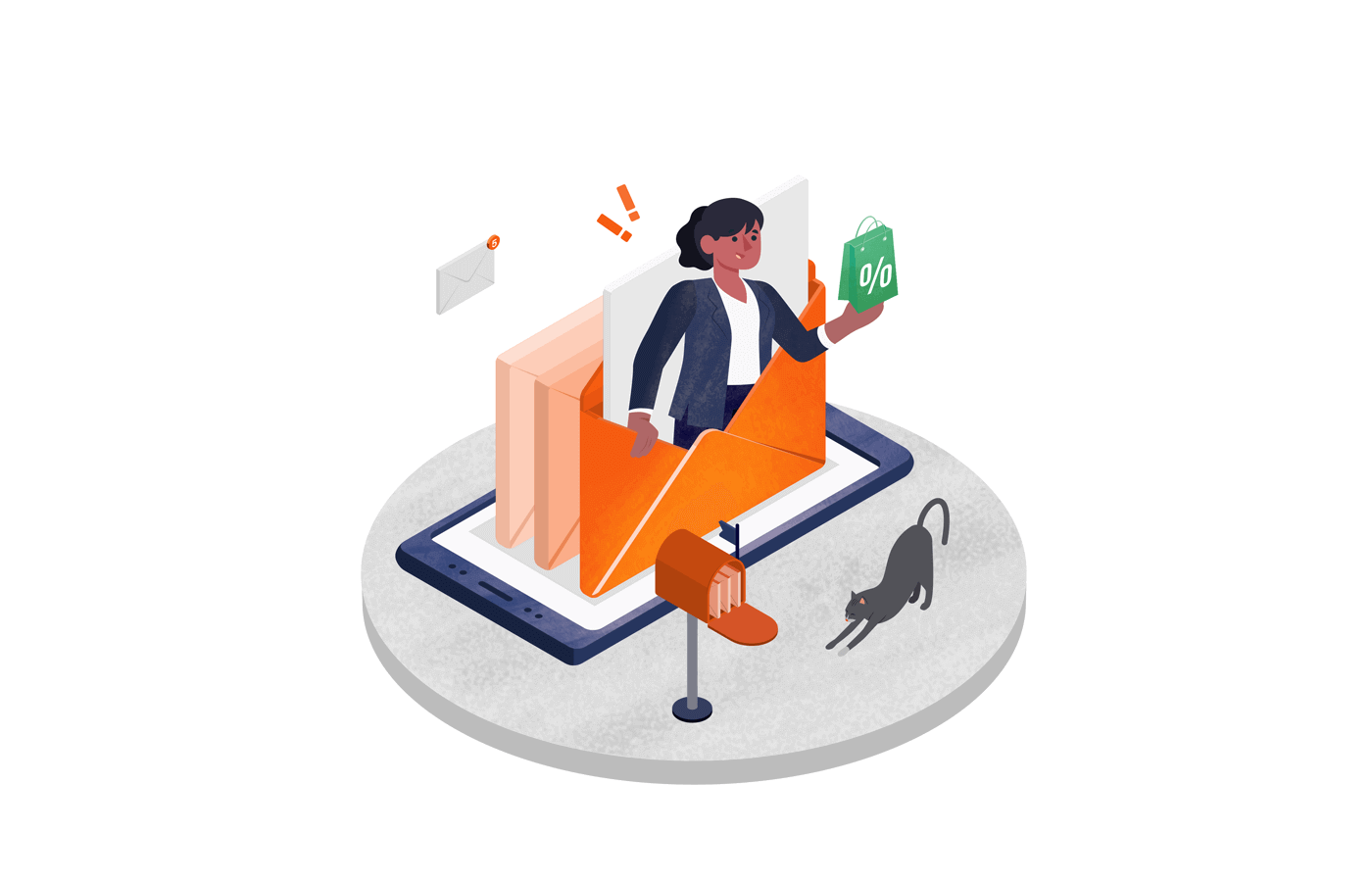Did you know the now-defunct computer manufacturer DEC ran the first email marketing campaign in 1978? Though the recipients criticized the campaign for being spammy even then, it was the first instance of email advertising in human history.
To date, email advertising remains one of the most effective methods for attracting new customers and retaining existing customers.
Not to mention that an email marketing strategy is easy to implement and promises engagement and phenomenal results when done correctly. How phenomenal, you ask? Email marketing generates, on average, $36 for every dollar spent and acquires 40x more customers than Meta and X.com combined.
In this blog post, we’ll look at how email advertising works and the benefits it brings to your business. You’ll also find examples of successful email marketing campaigns and how to create and launch within an email service provider. Let’s dive in!
What is Email Advertising?
Email marketing advertising is a form of direct marketing where you promote your products and services through emails. Email marketing advertising allows you to stay in the minds of consumers, explain your business’ value in their lives, and attract new business.
With an email advertising campaign, you can send highly targeted emails to specific segments within your audience. Delivering relevant offers and promotions helps to avoid the spam folder.
Types of Advertising Emails
Brands use different types of advertising emails to achieve different goals. Here are the most common types of advertising newsletters used by email marketers:
- Promotional emails. Designed to promote products, services, and/or offer discounts to encourage readers to buy something;
- Informational email. Generate awareness about a product, feature, or benefits with an intention to move them further towards making a purchase;
- Re-engagement emails. Sent to inactive recipients or customers with the intention to revive their interest in your brand’s products and offers and buy from you again;
- Welcome emails. This is the first email you send to subscribers, introducing them to your brand and offerings and sharing what to expect next;
- Abandoned cart emails. Sent to shoppers who forgot to check out after adding items to the cart. These emails try to make them complete their purchase by adding ‘extra’ offers or incentives with a countdown timer or element to invoke FOMO.
How Effective is Advertising by Email?
Email marketing is a proven way to connect with your audience and drive leads and conversions. It works because you deliver highly personalized content at the right time for your audience.
Here are some advantages of using email advertising for your business:
- ROI-driven and cost-effective. Email marketing offers a more affordable alternative to traditional advertising, with trackable ROI through analytics, giving you control over spending and revenue growth;
- Laser-sharp targeting through segmentation. Email advertising supports streamlined and personalized messaging to a pre-selected audience. If you want to see marketing get mad over outcomes, segment your audience and send genuine, personalized mail to a targeted subset;
- High ROI. Every $1 spent on email management is expected to return $38 in revenue. Sponsored, timely, and targeted emails can help you reach millions of consumers at meager rates;
- Easily measurable. Email campaigns help marketers turn cold leads or prospects into reoccurring buyers with ease and efficiency. Marketing automation and analytics ensure that every effort made on email advertising adds something to the bottom line;
- Customizable. Email marketing allows you to segment your audience to send personalized messaging. But it doesn’t stop there. By customizing email banners you can include the name, age, gender, and myriads of other custom features to let consumers know that you care deeply about their buying decisions.
6 Best Email Advertising Examples
There are many ways to use email newsletter advertising for your business. You can place email marketing ad in email newsletters, launch your own newsletters, or send promotional ads through email. Here are a few examples of targeted email campaigns to tinker your mind:
Email Advertisement by Lashify
Sending an advertisement in the form of mass email advertising is a popular marketing method used by thousands of brands around the globe. Some even run periodic email newsletters that integrate ads natively within the content. Here’s an example by Lashify:
Subject line: LIGHTS. LASHES. ACTION ✨
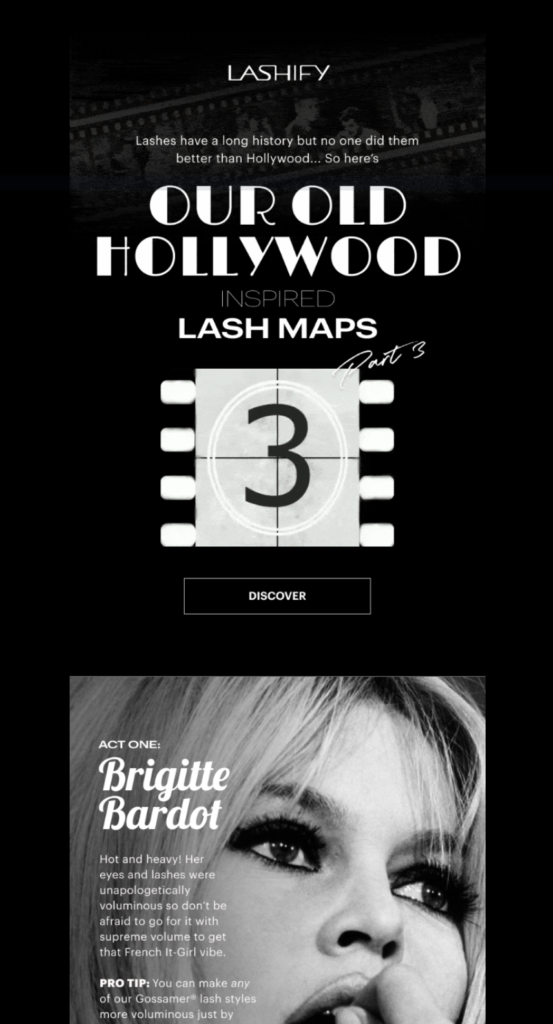
The email’s design theme and pattern are appealing. Combined with the enticing subject line in all caps, the email makes an immediate impact on the reader. Starting the newsletter with an interesting discussion grabs attention.
The rest of the newsletter is all about sharing different types of products along with a direct CTA to compel users to add items to the cart.
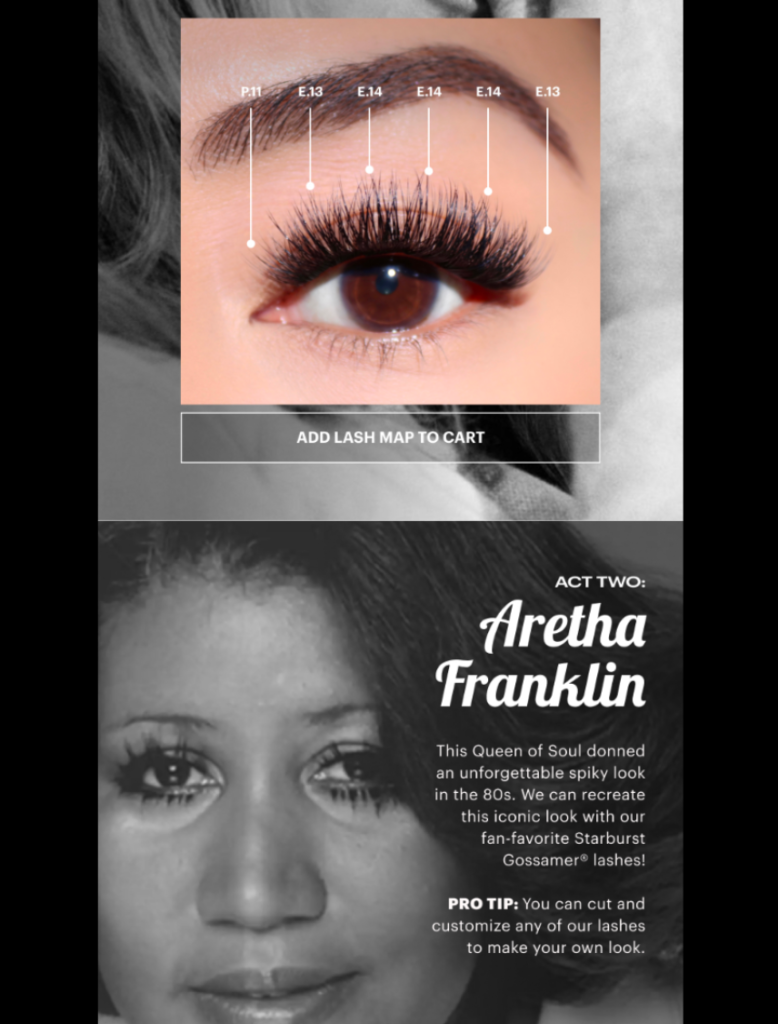
The newsletter is a smart move on the brand’s part, as everyone who clicks the link but doesn’t end up buying will then be nurtured using an automated abandoned cart email, increasing the chances of conversion.
Key Takeaways
- Create an appealing and click-worthy subject line (without being clickbait);
- Divide the newsletter into multiple sections for readability and easy ‘scrollability’;
- Add relevant CTAs to drive conversions.
Email campaigns without any hassle? Sender makes it possible. Create emails in a few clicks and watch your sales soar.
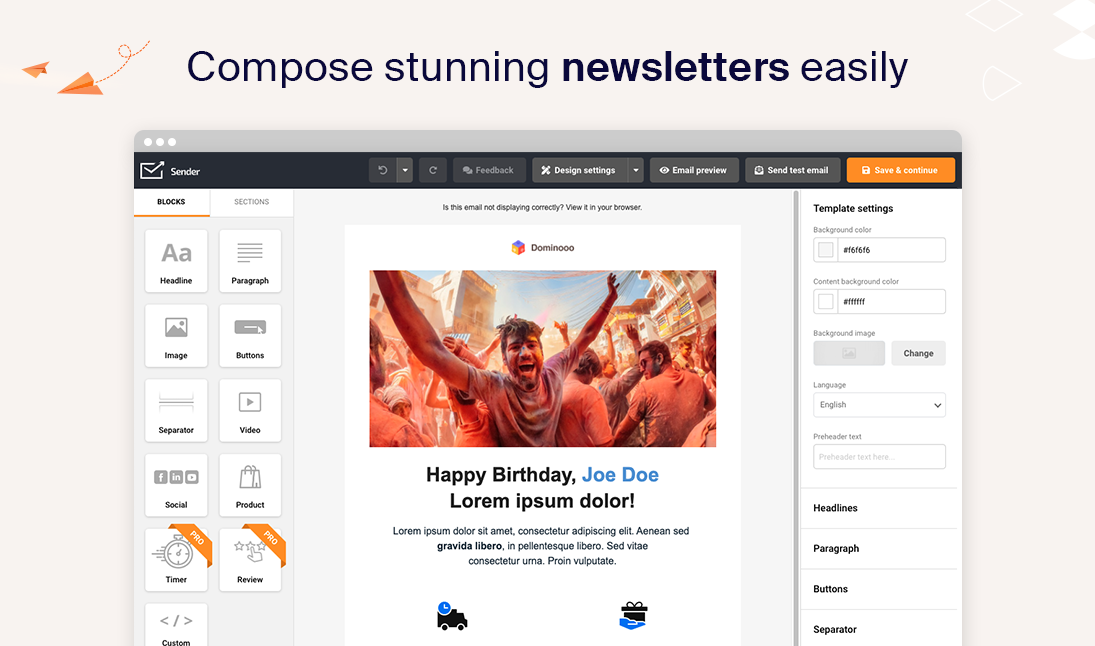
Ad Email by Mitchell & Ness Nostalgia
The best kind of email advertising is when a brand sends a promotional email to an interested list of subscribers. Many brands run daily campaigns to send ads via bulk email to their email list. Take the example of the following ad email by Mitchell & Ness Nostalgia:
Subject line: Just Dropped | NBA Reversible Bucket Hats & Melton Patch Snapbacks 🏀🧢
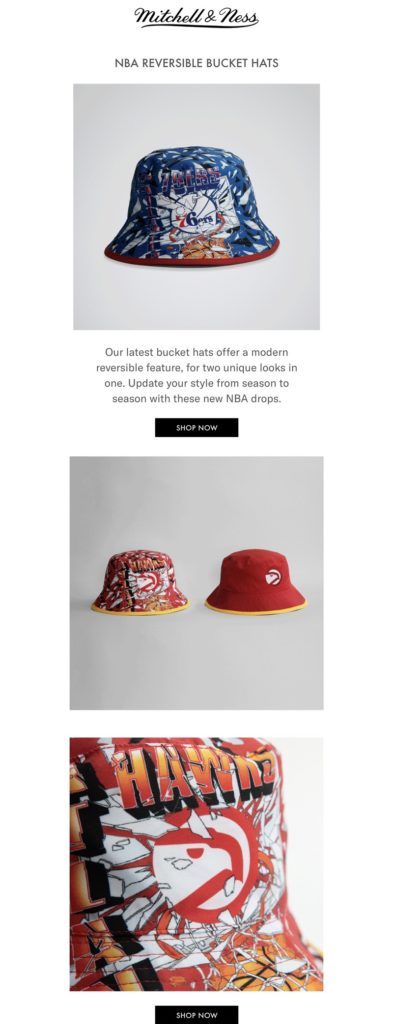
The email is a new product announcement in a promotional email ad. The simple layout of the email serves the purpose right — telling the user that the store has something new for them and persuading them to click on the CTA with a simple email copy at the top.
Key Takeaways
- Keep the layout simple and pleasing to the eyes;
- Use emojis in the subject line;
- Add product images and USPs in the email layout.
Newsletter Advertising Example by H&M
Running periodicals and branded newsletters is a great tactic to excite users about your latest offerings, collections, deals, and discounts. If you want to make the most of the email advertising opportunity, you can take inspiration from H&M, which runs a newsletter suggesting the latest fashion trends.
Subject Line: This ’90s jeans trend is back 👖
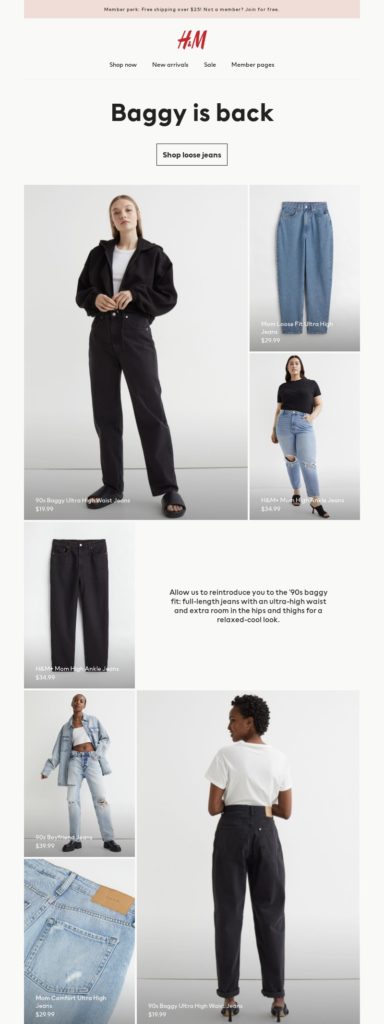
The emailer, in the form of a newsletter, shows the reader how to use the new collection to flaunt the trendy style that’s making a comeback. If you read further below, you will see the newsletter has a dedicated section about creating your own style with a CTA that takes them to the collection’s page:
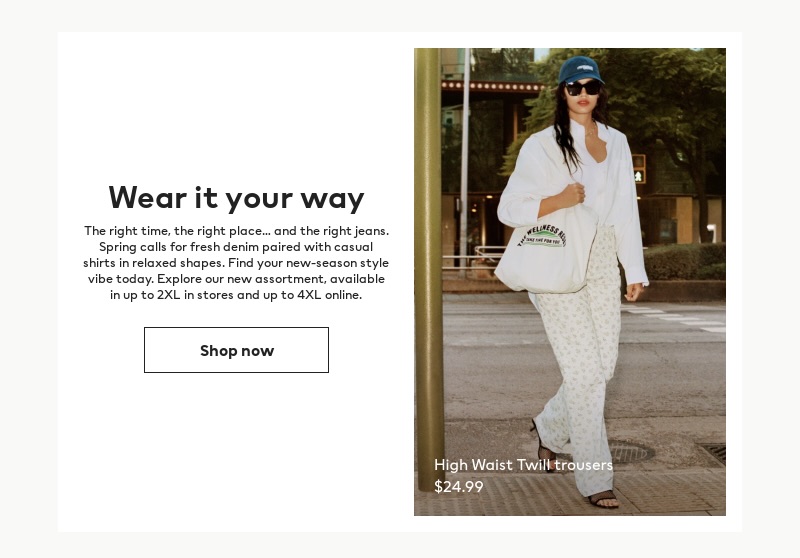
Key Takeaways
- Create longer emails in case you are creating a newsletter;
- Always stick to a particular theme; in this case — fashion trends;
- Send newsletter email ads at regular intervals.
Winback Email Advertisement by Martha & Marley Spoon
Sometimes, despite your best efforts, some customers can forget you. Re-engagement emails work wonders for a brand or business in such a situation. Winback emails invoke nostalgia, offer a comeback discount, and urge the customer to give you a second chance. Look at the following email by Martha & Marley Spoon:
Subject Line: Brian, we miss you!
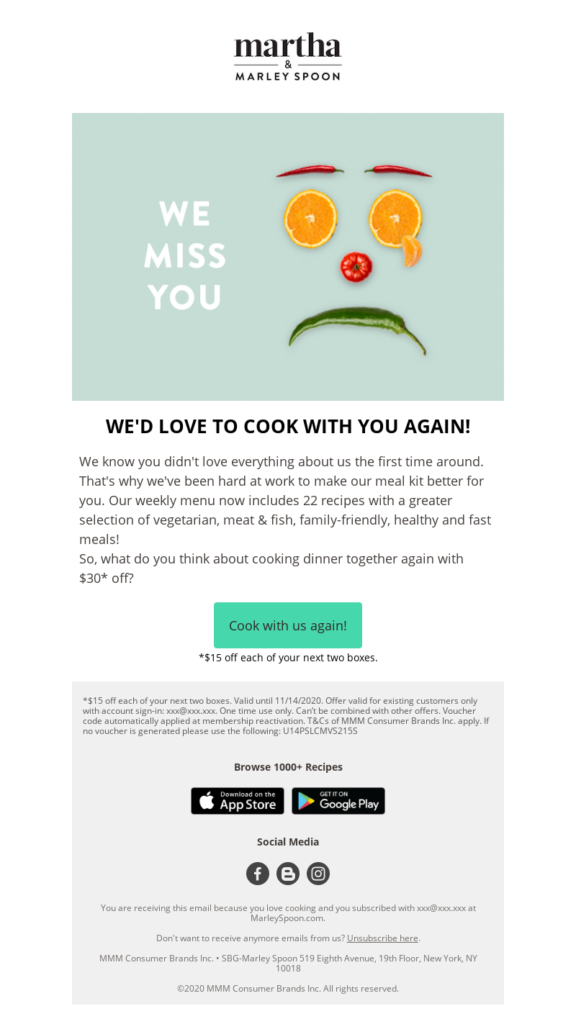
The email is sent to customers who ordered once and didn’t reorder again. The emotional email copy, along with a special offer, will make users want to come back and give the brand a chance again. They did a good job with the personalized subject line too.
Key Takeaways
- Create a nostalgic and emotional email copy;
- Personalize the subject line;
- Add a really useful offer or special discount.
Email Marketing Campaign by WeWork
Advertising your promo offers during holidays like Black Friday is a popular email advertising tactic. The results are also astonishing – customers spend 138% more when targeted using blast email promotions.
WeWork understands this and focuses its marketing efforts to promote an exciting offer through its Black Friday sales email.
Subject line: See what’s heating up on Black Friday
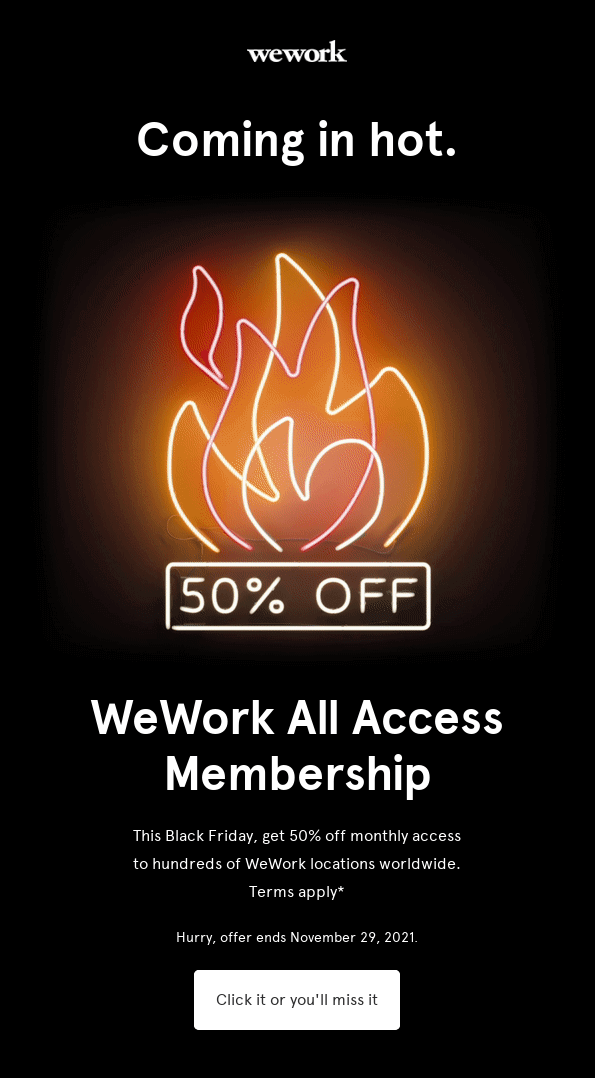
The email shines right from its subject line – creating intrigue in the recipient’s mind. The header image and headline are eye-catching; to top it all off, there’s a stunning offer – 50% off on all-access membership.
The CTA button copy is also click-worthy and will attract a lot of clicks from the audience with FOMO.
Key Takeaways
- Add a compelling subject line that makes people want to click;
- Keep it short and straightforward;
- Play with the CTA copy to induce FOMO.
Abandoned Cart Advertising Email by OUAI Haircare
You can use emails for advertising your product or outreach to the prospects who visited your website and added items to the cart but didn’t check out. Abandoned cart emails are known to increase ecommerce revenue and improve your bottom line. Take a look at the following abandoned cart email by Ouai Haircare:
Subject Line: Forgot your OUAI?
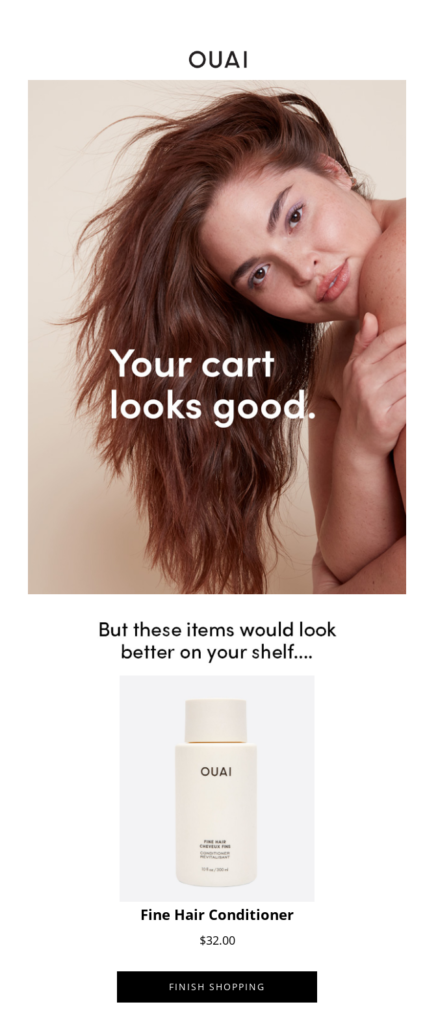
The email has a simple yet effective template. The large image with the one-liner creates an instant recall and connection with the reader.
The product block at the bottom of the email reminds users about what they left behind. Such an email, when sent at the right time, can instantly bring the shopper’s attention back to the products they had interest in, and (most likely) inspire to complete their purchase.
Key Takeaways
- Schedule your abandoned cart emails using an email marketing tool or marketing automation solution;
- Keep your abandoned cart email template simple and straightforward;
- Place a prominent CTA that brings the shopper back to their cart or your website.
How to Do a Successful Email Marketing Campaign?
Inspired to send seasonal marketing emails or promotional campaigns? Here’s how you can start sending email advertising campaigns to your audience:
Step 1: Find an Email Marketing Tool
To create email marketing campaigns, you’ll need an email marketing service. There are many email service providers in the industry. You should choose one with a drag-and-drop builder and marketing automation capabilities.
Sender’s got everything you need to create and send emails quickly and efficiently. With Sender, you can:
- Design email ads and newsletters from scratch or use readymade templates from its template library;
- Schedule personalized campaigns based on user behavior;
- Automate follow-ups using a visual marketing automation builder;
- Prevent getting caught in the spam filters due to excellent deliverability.
The best part – it’s free to use for up to 2,500 subscribers. So, you can set up an email advertisement campaign and consider the costs as you start getting results.
Step 2: Create/Upload Your Mailing List
Create a signup form on your highest traffic pages and ask users to sign up for your newsletter. Use the data to create a mailing list for your email ad campaign.
Start growing an email list on autopilot with Sender’s built-in form builder. You can even segment your email subscribers based on age, occupation, location, time zone, etc.
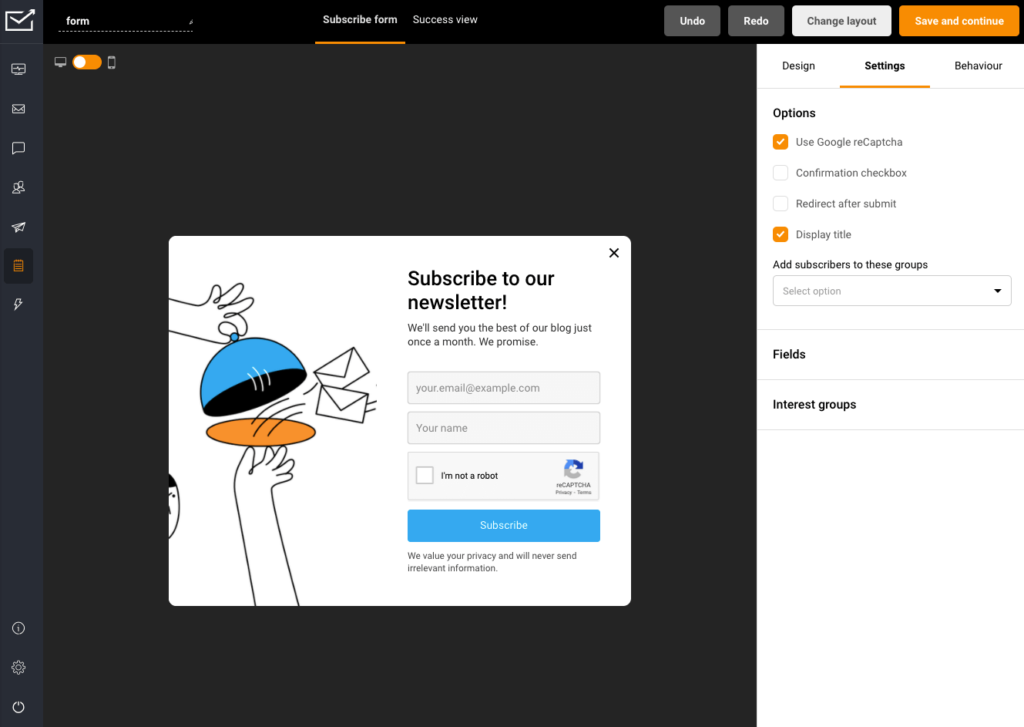
Alternatively, you can upload your existing email list to Sender, map the fields and start creating an email advertising campaign.
Step 3: Start a New Campaign
Go to new campaigns under email campaigns and start by adding details about your direct email advertising campaign. Write a catchy subject line and pre-header. You should brainstorm in advance and create an attention-grabbing copy for your email campaign.
Why?
Because according to Statista, about 333.2 billion emails are sent daily. This means the average person receives over 100 emails per day. You really need to grab their attention and stand out in the inbox.
Use the inbox preview feature to see how your email will appear in someone’s mailbox.
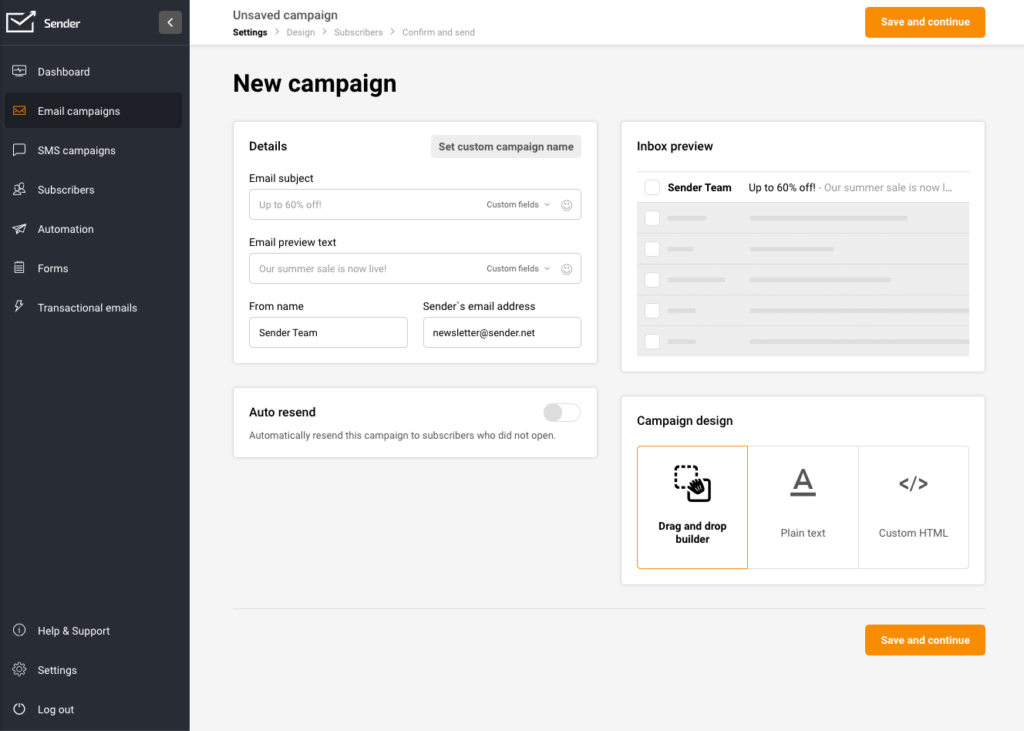
When you are happy with your subject line, click Save and Continue.
Step 4: Design an Engaging Email Ad
Use Sender’s drag-and-drop email builder to create a beautiful email template for your email marketing campaign.
The email builder allows you to customize your email template by adding your design/color theme and peppering it up with unique layout elements.
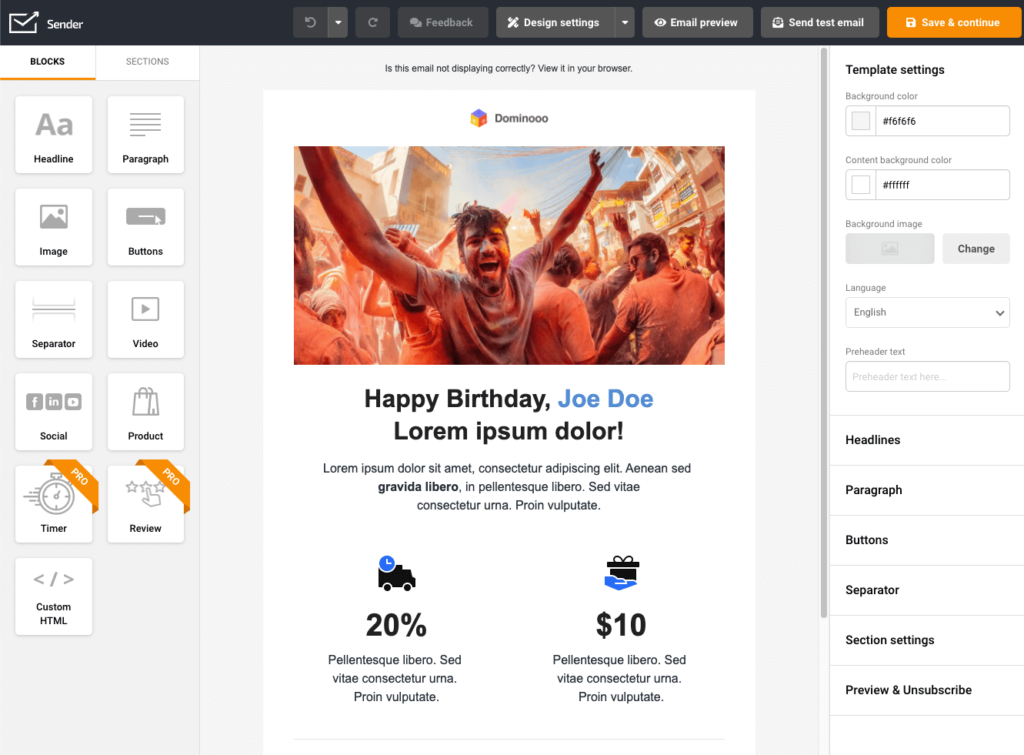
Create an intuitive emailer using the drag-and-drop email builder, and if you get stuck, use the in-built template library to import a high-performing emailer design and customize it to your liking.
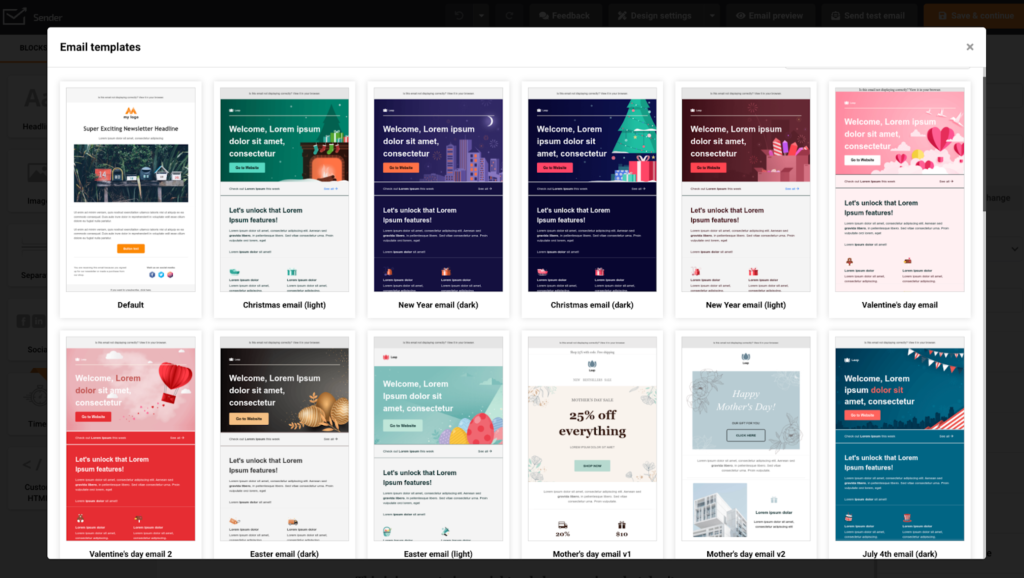
Step 5: Personalize Your Email Content
Producing unique and awesome advertising emails depends on your ability to customize an existing email template. You should create engaging email content and contextualize your design to make it eye-catchy and appealing.
Use the email builder to add unique design blocks, add your brand’s personality, or set up custom tags for email copy personalization.
When happy with your design, send a test email to yourself to see how it looks, and if everything’s fine, just click Save and Continue.
Step 6: Send Advertising Email and Track Results
The final step is to select the email list and send your mailing ad to your subscribers. Sender has a deep analytics dashboard that allows you to track performance from a single dashboard.
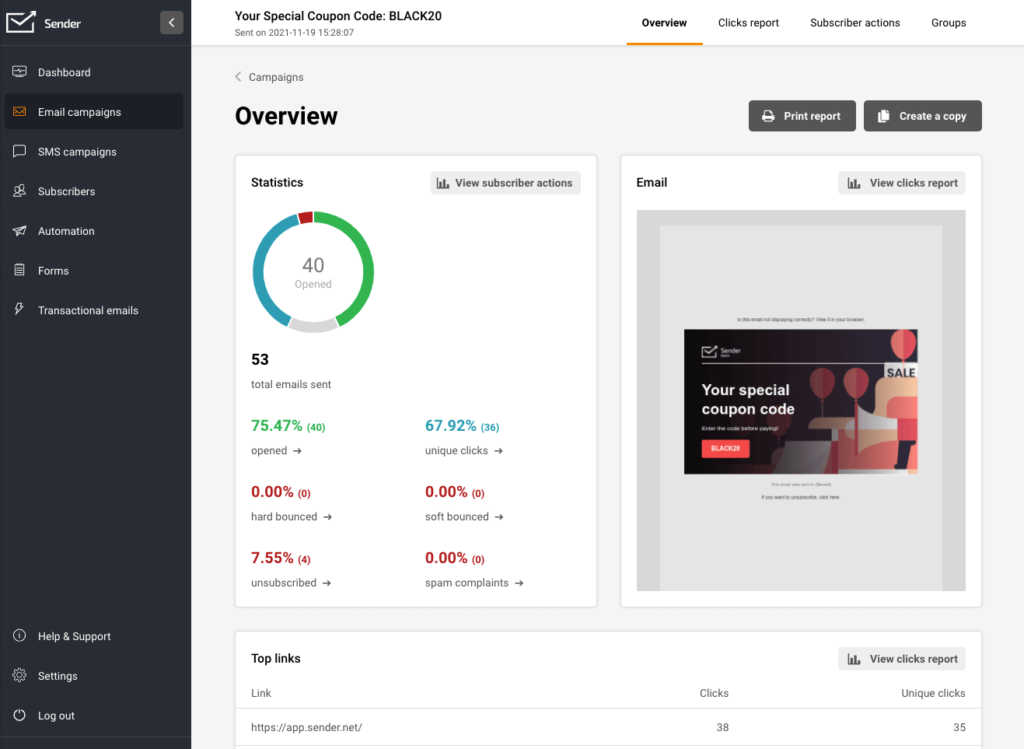
Use the insights to ensure the effectiveness of your future campaigns.
You don’t need to pay a penny to send your first email campaign when you choose Sender.
Email Marketing Strategy Tips to Get You Started
Your email campaigns should aim to build solid customer relationships, driving customer loyalty. If you are thinking of leveraging email advertising, here are email campaign best practices to help you get better results:
Make the Subscription Process Easy
The average online user’s attention span is 8 seconds.
So, you need to simplify the process of signing up for your email list. Irrespective of the marketing channels you use to promote your email list or newsletter, your signup process shouldn’t take more than a few seconds.
Introduce clear CTAs on relevant blog posts or website pages that help visitors sign up with a single or a few clicks.
Always Use Double Opt-ins
Double opt-ins confirm that you have a new subscriber. They’re like confirmation emails you send to verify that the subscriber signed up with a genuine email address. Plus, they’re a standard best practice for email signups post-GDPR.
Make your double opt-ins straightforward, short, and easy to read, with a clear “confirmation” button allowing subscribers to issue their explicit interest to receive emails from you.
Optimize Your Email Subject Line, Preview Text, and Sender Name
Your email subject lines and preview text are the first thing someone notices about your email campaign. So, you really need to give your best shot at creating a compelling and attention-grabbing subject line. Your preview text should be a teaser that compels the reader to click as well.
Don’t forget that your sender name should be professional and clear, too. It shouldn’t be deceiving or cryptic. Always pay special attention to these three elements while keeping copywriting best practices in mind.
Use Segmentation for Your Email Lists
Segmentation is one of the most important aspects of email marketing. Use customer segmentation to target the correct audience, add value, and gain trust. It helps you tailor your email ad campaign to the likes of your target audience. This helps increase open rates, click rates, and improve your marketing ROI.
You can segment your list based on any relevant demographics, interests, behaviors, and other relevant data.
When segmenting your list, make sure your segmentation logic is:
- Relevant to your business goal;
- Helps you target a specific need, desire, or pain point without generalizing a campaign;
- Flexible enough to fit any changes in your target audience.
Practice Personalization
Personalization is the most crucial aspect of effective email campaigns. Personalized emails bring back the same level of interest as a handwritten letter and are known to grab the attention of your reader.
Every single email you send should be tailored to your customer’s needs and personalized using their data. Use first names, locations, or any other data point to personalize your emails.
Here are a few ways to personalize your emails to help you succeed:
- Send a personalized welcome email every time someone signs up for your email list;
- Use dynamic content tags or fields that are personalized based on the actions taken by your customers.
- Personalize your subject lines and CTAs to catch their attention and make them click through.
- Send a personalized coupon code based on their purchase history.
Strategically Schedule Your Emails
Engaging audiences comes with a “perfect timing” rule.
Send emails at an appropriate time—schedule “emailing” times regarding time zones—mainly if your brand deals with an international market.
Some tips for ‘perfect timing’ include:
- Identifying your target audience
- Knowing what they do for a living
- Pinpointing their main problems
- Drafting personas about what a typical day in their life looks like
In general, we suggest you send emails between 9 am & 11 am because those are office hours – research shows that we’ve subconsciously developed a habit of checking emails during work hours.
Every business has its own groove when it comes to activity, right? Customize your approach to match each business’s prime time and find the best time to send your emails in by email type.
Split-Testing Does the Trick Too
Take split-testing as “not putting all your eggs in one basket”.
With split-testing, marketers can strategically decide which ad format, CTAs, sample content, send time, or signature format works best.
Try new campaign ideas and weigh customer reaction – highlight delivery rates, open rates, click-through rates, etc. Split testing allows you to optimize your company’s reoccurring campaigns for success.
Also read: A/B Testing in Email Marketing & Best Split Test Practices
Email Advertising: Key Takeaways
When considering an email-based advertising campaign, you should be meticulous with planning and have a no-brainer offer. Rest, keep the following tips and best practices in mind for maximum impact:
- Add regular promotional emails and email ads to your email marketing strategy;
- Segment your audience to create an effective email marketing campaign;
- Always let your audience know the intention of your marketing emails;
- Pick a reliable email service provider that allows you to schedule an automated email campaign.
Prepare your online advertising strategy for the year by exploring our article, complete with practical examples & key statistics for 2024.
Author Bio
Anmol Ratan Sachdeva is a content marketer and small business consultant who has a strong grip on topics like marketing automation, research, email marketing, and content marketing. He loves to write about starting, improving, and growing a business.
